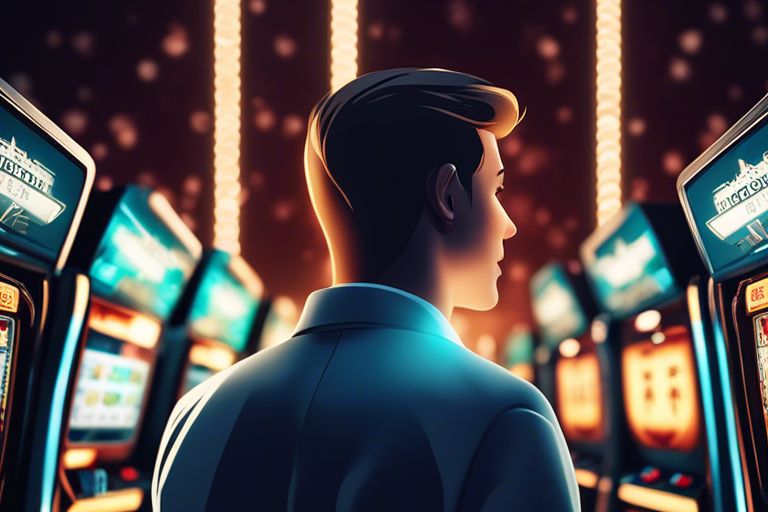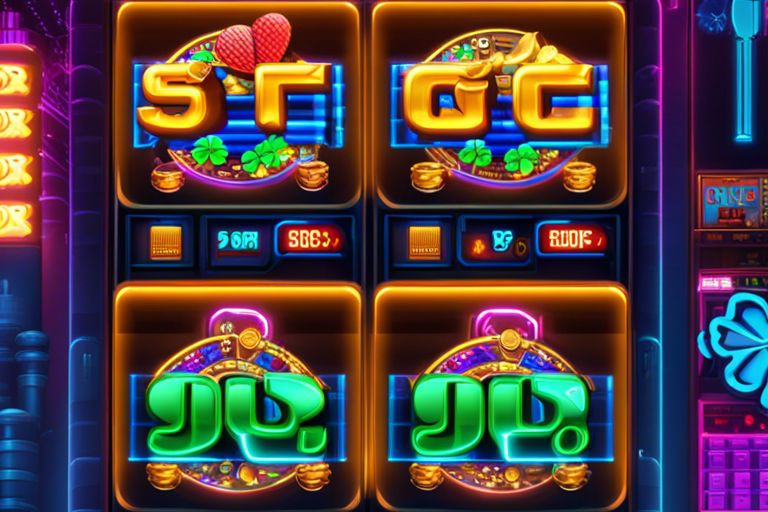Recognizing Problematic Gambling Habits – A Guide To Seeking Help And Regaining Control In Slots.

Just when you thought that spinning those reels was all fun and games, you realize that the thrill can sometimes lead you down a rabbit hole of problematic gambling habits. In this guide, you’ll learn to spot the warning signs, understand why it matters, and discover how to take the reins back from those alluring slots. With a dash of humor and a sprinkle of empathy, we’ll walk you through the steps to identify your habits and seek help, so you can make informed choices about your gaming adventures. Key Takeaways: Awareness of gambling habits is crucial: Recognizing the signs of problematic gambling, such as frequent losses or increasing time spent on slots, can help individuals take the first step towards seeking help. Seeking support is necessary: Engaging with professionals, support groups, or counseling can provide the necessary guidance and strategies to regain control over gambling behaviors. Setting boundaries and limitations: Implementing personal limits on time and spending can aid in managing gambling habits and prevent escalation into a more serious issue. Identifying the Warning Signs The journey towards recognizing problematic gambling habits begins with identifying the warning signs that may indicate you are treading into risky territory. It’s not uncommon for individuals engaging with slots to dismiss their behaviors as mere fun or harmless entertainment. However, it’s imperative to take a magnifying glass to your engagement as this can unveil underlying issues that may need your immediate attention. Being proactive in this self-assessment can vastly improve your odds of regaining control over your gambling habits and overall well-being. Recognizing the Emotional Triggers Any experienced slot player knows that emotions can wield a heavy hand in the choices you make—sometimes even more than logic. If you find yourself consistently drawn to the machines when you’re feeling anxious, lonely, or overwhelmed, this may be your emotional trigger waving a red flag. Let’s face it, putting a quarter in a slot machine can feel like a mini escape from a challenging day, but if you’re using this as your primary coping mechanism, it’s worth reevaluating your emotional toolkit. Moreover, if winning—or the thrill of the spin—makes your heart race in a way that other daily joys fail to match, that euphoric feeling could signal trouble. Navigating emotions can often feel like walking a tightrope, but your awareness around these triggers could save you from tumbling into the pit of compulsive gambling. Spotting the Behavioral Patterns Any seasoned observer might tell you that behavioral patterns are often the telltale signs of larger issues lurking in the shadows. When you start noticing changes in how you approach slots—whether it’s an increase in frequency or spending—you might be entering problematic behavior. For some, it might manifest in the compulsive need to play even when you have no intention of winning, while for others, it could show up as neglecting responsibilities in favor of a late-night slot session. You’ll find that the clues are littered throughout your daily life, but spotting them requires a clear and honest gaze. Plus, keeping a gripping tally on how often you play and your emotional states during these sessions can serve as a compass pointing you to the patterns that demand your attention. Are you playing to escape reality? Or do you find yourself thinking more about the next slot than your responsibilities? These questions can be critical in identifying your gambling behavior and how it relates to your daily routines. The Role of Environment and Social Influences Recognizing the environment and social influences in your gambling behavior can be just as imperative as pinpointing emotional triggers and behavioral patterns. Often, you may find that your surroundings—whether it’s the company you keep or the atmosphere of the venue—can heavily influence your gambling habits. If your friends cheer you on when you hit the casino, you might feel more compelled to join in, even if your instincts are warning you to step back. The thrill can be contagious, but so can the habit. Understanding the impact of friends, family, or even coworkers on your gambling choices can shed light on how much control you truly have over your decisions. Are they encouraging you to keep playing in times of loss simply because it’s an enjoyable group activity? The clarity gained from assessing these social dynamics is crucial for developing a healthier relationship with gambling, as well as fostering mindfulness around your choices. The Consequences of Problematic Gambling Any conversation about gambling would be incomplete without addressing the darker side of this pastime—the potential consequences that can ripple through your life when habits cross the line into problematic gambling. Recognizing these consequences is vital, as it can guide you toward seeking help and, ultimately, regaining control. While spinning those reels might seem like harmless fun, it’s vital to acknowledge that they can lead to a series of catastrophic outcomes that affect not only you but also those around you. Financial Fallout: Debts and Bankruptcy Fallout from problematic gambling often manifests in the form of financial devastation. You might start off with just a casual game at the slots, thinking it’s a harmless way to unwind, but before you know it, you’re borrowing from friends and family, tapping into credit lines, or even draining your bank account in the pursuit of that elusive win. Those initial small losses can balloon into massive debts, leaving you in a financial fog that seems impossible to escape. When bills go unpaid and the constant stress over money builds, you may find yourself at a tipping point—you could face bankruptcy, which can haunt your credit history for years and make obtaining loans or even renting an apartment a challenge. Unfortunately, this financial disarray tends to trap you in a vicious cycle where you chase losses, convinced that another go at the slots will help you recoup. As you dig deeper to ‘win it all back,’ the costs keep accumulating, creating a whirlwind of stress and anxiety. It’s important to realize that while gambling might promise instant
Recognizing Problematic Gambling Habits – A Guide To Seeking Help And Regaining Control In Slots.

Just when you thought that spinning those reels was all fun and games, you realize that the thrill can sometimes lead you down a rabbit hole of problematic gambling habits. In this guide, you’ll learn to spot the warning signs, understand why it matters, and discover how to take the reins back from those alluring slots. With a dash of humor and a sprinkle of empathy, we’ll walk you through the steps to identify your habits and seek help, so you can make informed choices about your gaming adventures. Key Takeaways: Awareness of gambling habits is crucial: Recognizing the signs of problematic gambling, such as frequent losses or increasing time spent on slots, can help individuals take the first step towards seeking help. Seeking support is necessary: Engaging with professionals, support groups, or counseling can provide the necessary guidance and strategies to regain control over gambling behaviors. Setting boundaries and limitations: Implementing personal limits on time and spending can aid in managing gambling habits and prevent escalation into a more serious issue. Identifying the Warning Signs The journey towards recognizing problematic gambling habits begins with identifying the warning signs that may indicate you are treading into risky territory. It’s not uncommon for individuals engaging with slots to dismiss their behaviors as mere fun or harmless entertainment. However, it’s imperative to take a magnifying glass to your engagement as this can unveil underlying issues that may need your immediate attention. Being proactive in this self-assessment can vastly improve your odds of regaining control over your gambling habits and overall well-being. Recognizing the Emotional Triggers Any experienced slot player knows that emotions can wield a heavy hand in the choices you make—sometimes even more than logic. If you find yourself consistently drawn to the machines when you’re feeling anxious, lonely, or overwhelmed, this may be your emotional trigger waving a red flag. Let’s face it, putting a quarter in a slot machine can feel like a mini escape from a challenging day, but if you’re using this as your primary coping mechanism, it’s worth reevaluating your emotional toolkit. Moreover, if winning—or the thrill of the spin—makes your heart race in a way that other daily joys fail to match, that euphoric feeling could signal trouble. Navigating emotions can often feel like walking a tightrope, but your awareness around these triggers could save you from tumbling into the pit of compulsive gambling. Spotting the Behavioral Patterns Any seasoned observer might tell you that behavioral patterns are often the telltale signs of larger issues lurking in the shadows. When you start noticing changes in how you approach slots—whether it’s an increase in frequency or spending—you might be entering problematic behavior. For some, it might manifest in the compulsive need to play even when you have no intention of winning, while for others, it could show up as neglecting responsibilities in favor of a late-night slot session. You’ll find that the clues are littered throughout your daily life, but spotting them requires a clear and honest gaze. Plus, keeping a gripping tally on how often you play and your emotional states during these sessions can serve as a compass pointing you to the patterns that demand your attention. Are you playing to escape reality? Or do you find yourself thinking more about the next slot than your responsibilities? These questions can be critical in identifying your gambling behavior and how it relates to your daily routines. The Role of Environment and Social Influences Recognizing the environment and social influences in your gambling behavior can be just as imperative as pinpointing emotional triggers and behavioral patterns. Often, you may find that your surroundings—whether it’s the company you keep or the atmosphere of the venue—can heavily influence your gambling habits. If your friends cheer you on when you hit the casino, you might feel more compelled to join in, even if your instincts are warning you to step back. The thrill can be contagious, but so can the habit. Understanding the impact of friends, family, or even coworkers on your gambling choices can shed light on how much control you truly have over your decisions. Are they encouraging you to keep playing in times of loss simply because it’s an enjoyable group activity? The clarity gained from assessing these social dynamics is crucial for developing a healthier relationship with gambling, as well as fostering mindfulness around your choices. The Consequences of Problematic Gambling Any conversation about gambling would be incomplete without addressing the darker side of this pastime—the potential consequences that can ripple through your life when habits cross the line into problematic gambling. Recognizing these consequences is vital, as it can guide you toward seeking help and, ultimately, regaining control. While spinning those reels might seem like harmless fun, it’s vital to acknowledge that they can lead to a series of catastrophic outcomes that affect not only you but also those around you. Financial Fallout: Debts and Bankruptcy Fallout from problematic gambling often manifests in the form of financial devastation. You might start off with just a casual game at the slots, thinking it’s a harmless way to unwind, but before you know it, you’re borrowing from friends and family, tapping into credit lines, or even draining your bank account in the pursuit of that elusive win. Those initial small losses can balloon into massive debts, leaving you in a financial fog that seems impossible to escape. When bills go unpaid and the constant stress over money builds, you may find yourself at a tipping point—you could face bankruptcy, which can haunt your credit history for years and make obtaining loans or even renting an apartment a challenge. Unfortunately, this financial disarray tends to trap you in a vicious cycle where you chase losses, convinced that another go at the slots will help you recoup. As you dig deeper to ‘win it all back,’ the costs keep accumulating, creating a whirlwind of stress and anxiety. It’s important to realize that while gambling might promise instant






